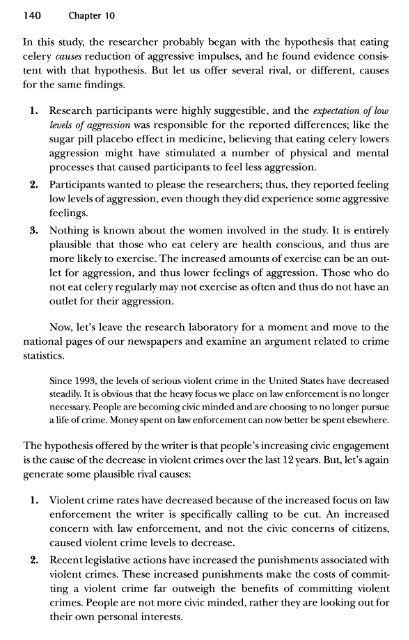Asking the Right Questions, A Guide to Critical Thinking, 8th Ed
Asking the Right Questions, A Guide to Critical Thinking, 8th Ed
Asking the Right Questions, A Guide to Critical Thinking, 8th Ed
Create successful ePaper yourself
Turn your PDF publications into a flip-book with our unique Google optimized e-Paper software.
140 Chapter 10<br />
In this study, <strong>the</strong> researcher probably began with <strong>the</strong> hypo<strong>the</strong>sis that eating<br />
celery causes reduction of aggressive impulses, and he found evidence consistent<br />
with that hypo<strong>the</strong>sis. But let us offer several rival, or different, causes<br />
for <strong>the</strong> same findings.<br />
1. Research participants were highly suggestible, and <strong>the</strong> expectation of low<br />
levels of aggression was responsible for <strong>the</strong> reported differences; like <strong>the</strong><br />
sugar pill placebo effect in medicine, believing that eating celery lowers<br />
aggression might have stimulated a number of physical and mental<br />
processes that caused participants <strong>to</strong> feel less aggression.<br />
2. Participants wanted <strong>to</strong> please <strong>the</strong> researchers; thus, <strong>the</strong>y reported feeling<br />
low levels of aggression, even though <strong>the</strong>y did experience some aggressive<br />
feelings.<br />
3. Nothing is known about <strong>the</strong> women involved in <strong>the</strong> study. It is entirely<br />
plausible that those who eat celery are health conscious, and thus are<br />
more likely <strong>to</strong> exercise. The increased amounts of exercise can be an outlet<br />
for aggression, and thus lower feelings of aggression. Those who do<br />
not eat celery regularly may not exercise as often and thus do not have an<br />
outlet for <strong>the</strong>ir aggression.<br />
Now, let's leave <strong>the</strong> research labora<strong>to</strong>ry for a moment and move <strong>to</strong> <strong>the</strong><br />
national pages of our newspapers and examine an argument related <strong>to</strong> crime<br />
statistics.<br />
Since 1993, <strong>the</strong> levels of serious violent crime in <strong>the</strong> United States have decreased<br />
steadily. It is obvious that <strong>the</strong> heavy focus we place on law enforcement is no longer<br />
necessary. People are becoming civic minded and are choosing <strong>to</strong> no longer pursue<br />
a life of crime. Money spent on law enforcement can now better be spent elsewhere.<br />
The hypo<strong>the</strong>sis offered by <strong>the</strong> writer is that people's increasing civic engagement<br />
is <strong>the</strong> cause of <strong>the</strong> decrease in violent crimes over <strong>the</strong> last 12 years. But, let's again<br />
generate some plausible rivalcauses:<br />
1. Violent crime rates have decreased because of <strong>the</strong> increased focus on law<br />
enforcement <strong>the</strong> writer is specifically calling <strong>to</strong> be cut. An increased<br />
concern with law enforcement, and not <strong>the</strong> civic concerns of citizens,<br />
caused violent crime levels <strong>to</strong> decrease.<br />
2. Recent legislative actions have increased <strong>the</strong> punishments associated with<br />
violent crimes. These increased punishments make <strong>the</strong> costs of committing<br />
a violent crime far outweigh <strong>the</strong> benefits of committing violent<br />
crimes. People are not more civic minded, ra<strong>the</strong>r <strong>the</strong>y are looking out for<br />
<strong>the</strong>ir own personal interests.



